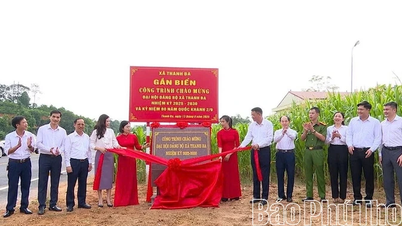The Draft Law on Higher Education (amended) consists of 9 chapters and 54 articles. In Chapter VI on quality assurance and accreditation, the Draft mentions that higher education institutions are responsible for building, operating and developing an internal quality assurance system to ensure compliance with legal regulations, domestic or international quality standards suitable to actual conditions, contributing to the implementation of the school's development strategy.

Illustration photo (baochinhphu.vn)
Article 37 of Chapter VI clearly states that the standards for assessment and accreditation of higher education quality are the basis for determining the level of quality achieved by higher education institutions and training programs. Assessment and accreditation standards are developed in accordance with the mission and functions of higher education institutions, referring to regional and international standards. Assessment and accreditation standards include: Standards for higher education institutions and standards for training programs.
Article 38 of the Draft Law stipulates that higher education institutions and training programs must be periodically assessed for quality according to standards issued by the Ministry of Education and Training . Forms of quality assessment include: Self-assessment conducted by educational institutions and external assessment conducted by organizations with professional competence.
Regarding higher education accreditation, the Draft Law clearly states that educational institutions are allowed to choose appropriate accreditation organizations that meet the following requirements: Domestic accreditation organizations are licensed by competent authorities to operate, conduct external assessments, and conduct accreditation according to standards issued by the Ministry of Education and Training or according to a set of standards developed by quality accreditation organizations in accordance with the international standards framework, assessed, recognized and permitted to be applied by the Ministry of Education and Training, on the basis that the organization is recognized by a competent international organization; Foreign accreditation organizations with international prestige, recognized to operate in Vietnam, assess and conduct accreditation according to international standards.
The current Law on Higher Education is empowering accreditation organizations to conduct external assessments and establish councils to review and recognize the achievement of higher education quality standards. In reality, the mechanism for accreditation of higher education quality without the assessment of state management agencies or independent organizations reduces the role and effectiveness of state management and does not ensure the reliability of assessment results and recognition of quality standards.
Furthermore, the regulation on compulsory accreditation and external assessment of all training programs causes overload and expense for higher education institutions. The compulsory accreditation of all training programs as prescribed by the Law creates great pressure and high costs for higher education institutions and overloads the accreditation system. The imbalance between the capacity of accreditation organizations and the accreditation needs of higher education institutions also creates consequences such as formality, coping and leads to the loss of positive effects of quality accreditation work.
New contents of the Draft Law on Higher Education (amended), including contents on quality assurance and accreditation, will be submitted to the National Assembly and are expected to be approved at the 10th session of the 15th National Assembly in October this year.
Quality assurance is the backbone of higher education.
Educational quality assessment is the basis for determining the standards of training quality and educational services of universities. So, in the Law on Higher Education (amended), what content needs to be adjusted and improved?
VOV Channel reporter had an interview with delegate Nguyen Thi Viet Nga, member of the National Assembly's Committee on Culture and Society.
PV: Dear delegate, how important is the assurance and accreditation of university education quality?
Delegate Nguyen Thi Viet Nga: Ensuring and assessing the quality of education has always been the backbone of modern higher education. Not only in Vietnam but also in many advanced countries in the world, quality assessment has been focused. This is a tool to assess the standard level of higher education institutions and training programs, thereby helping the State to manage effectively and society to monitor more closely and transparently, and learners have a basis to make the right choice of which major and school to study.
Through the quality assurance and accreditation mechanism, we will promote a culture of continuous improvement in educational and training institutions, avoid stagnation and backwardness, and encourage healthy competition based on quality. When accreditation results are recognized and trusted, the degrees and competencies of Vietnamese students will have higher value in the domestic and international labor market - which is still our weakness. Quality accreditation is not just a certificate but a commitment of the school to learners and to society.
PV: So, what contributions do you have to the mechanism for ensuring and assessing the quality of higher education in the Draft Law on Higher Education (amended) to help the state manage this issue more effectively?

Delegate Nguyen Thi Viet Nga
Delegate Nguyen Thi Viet Nga: Firstly, the internal quality assurance system of each higher education institution needs to be more clearly legalized. This must be considered a mandatory condition for being allowed to train. Only then will external accreditation have a reliable basis.
Second, it is necessary to clearly define the responsibilities and powers of the quality inspection organization. The inspection organization must be independent, transparent, and reputable, avoiding the situation of "both playing football and blowing the whistle".
Third, the State's supervision mechanism must be strong enough. The Ministry of Education and Training must be responsible for promulgating standards for assessment and supervision of accreditation activities. At the same time, in accreditation activities, it is necessary to promote the application of digital technology and national databases to improve transparency and information retrieval.
With these contributions, I want to aim for an accreditation system where the assessment results truly reflect the quality to create trust for society and have the most accurate assessment of higher education institutions.
PV: If approved by the National Assembly, according to the delegate, what will be the practical significance of the new contents of the Draft Law on Higher Education (amended)?
Delegate Nguyen Thi Viet Nga: If passed by the National Assembly, the Law on Higher Education (amended) will bring about positive impacts, especially the contents that are of interest to many voters and those working in the education sector, such as expanding autonomy associated with accountability of higher education institutions. This will help higher education institutions be more proactive in organizing training, in training research and international cooperation. Secondly, the content on the quality assurance and accreditation mechanism, when adjusted, will help elevate accreditation to a new level, contributing to building social trust, increasing the prestige of Vietnamese degrees and promoting international integration. Thirdly, financial and investment policies, along with encouraging non-budgetary investment, will create strong momentum for the higher education system to develop evenly, narrowing the gap between regions.
PV: Yes. Thank you, delegates!
Reduced testing in some areas
The quality assessment process is the basis for evaluating and improving educational activities, thereby promoting sustainable and long-term development for the higher education system.
VOV reporter had an interview with Prof. Dr. Nguyen Quy Thanh, Principal of the University of Education, Vietnam National University, Hanoi, about his contributions to this content in the Law on University Education (amended):
PV: In your opinion, in the Law on Higher Education (amended), is it necessary to accredit all university education programs?
Prof. Dr. Nguyen Quy Thanh: The Draft Law mentioned that quality must be ensured from within, which is correct. However, if there is no mechanism to evaluate the entire process of the quality assurance mechanism, it can lead to laxity because normally, higher education institutions as well as scientists are quite confident about the quality of their products, but that confidence must be placed in a regular monitoring mechanism. The Draft Law on quality assurance needs careful consideration because Vietnamese higher education has not developed to the point where we can completely abandon quality assurance.
In my opinion, it is possible to reduce the inspection burden in some areas, but some areas still require inspection. Second, it is required to inspect all programs that require a license to practice later because it is related to the quality of the labor market; or areas that the State orders such as teacher training also need to be inspected.

Prof. Dr. Nguyen Quy Thanh
PV: What are your expectations for the new contents of the draft Law when it is adjusted and officially issued?
Prof. Dr. Nguyen Quy Thanh: The Law on Higher Education (amended) currently being drafted is a continuation of the higher education innovations from 2012 and 2018. When it is promulgated, it will create a "push" to continue making breakthroughs in the current period. I expect that the operating mechanism of higher education institutions will be created with new favorable conditions, and the shape and position of the Vietnamese higher education system in the world higher education will be better.
PV: Yes, thank you for this interview.
In the context of higher education institutions being given greater autonomy, the role of the State in assessing the quality of higher education is even more important. Although the State creates conditions for higher education institutions to be “autonomous”, it does not mean that management work is loosened; on the contrary, there needs to be tighter control over the quality of higher education. |
According to VOV
Source: https://baothanhhoa.vn/co-nhat-thiet-phai-kiem-dinh-moi-chuong-trinh-giao-duc-dai-hoc-260994.htm




![[Photo] General Secretary To Lam chaired the Politburo's working session with the Standing Committees of Party Committees of Central Party agencies.](https://vphoto.vietnam.vn/thumb/1200x675/vietnam/resource/IMAGE/2025/9/9/8343386e1e8f43c6a3c0543da7744901)

![[Photo] Politburo works with the Standing Committees of Vinh Long and Thai Nguyen Provincial Party Committees](https://vphoto.vietnam.vn/thumb/1200x675/vietnam/resource/IMAGE/2025/9/8/4f046c454726499e830b662497ea1893)





![[Update] Schools in Thanh Hoa province solemnly held "special" opening ceremonies](https://vphoto.vietnam.vn/thumb/402x226/vietnam/resource/IMAGE/2025/9/5/de3e1b2d53484972b56866da2d729a27)


























![[Photo] Politburo works with the Standing Committees of Dong Thap and Quang Tri Provincial Party Committees](https://vphoto.vietnam.vn/thumb/1200x675/vietnam/resource/IMAGE/2025/9/8/3e1c690a190746faa2d4651ac6ddd01a)
![[Photo] Politburo works with the Standing Committees of Phu Tho and Dong Nai Provincial Party Committees](https://vphoto.vietnam.vn/thumb/1200x675/vietnam/resource/IMAGE/2025/9/8/f05d30279b1c495fb2d312cb16b518b0)


































































Comment (0)